Iran Sells 1,000-Plus Drones And Other Weapons To Russia: Zelensky
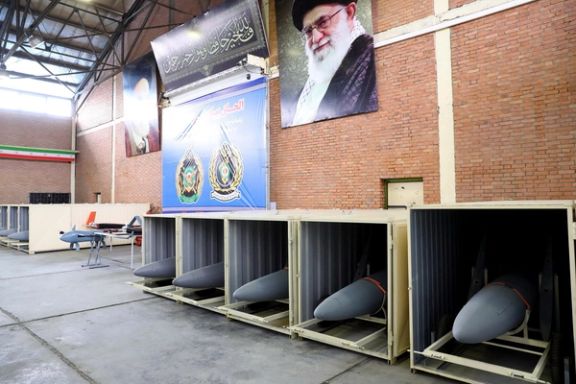
Iran has been accused by Ukraine’s president of selling more than 1,000 drones “and other weapons” to Russia.

Iran has been accused by Ukraine’s president of selling more than 1,000 drones “and other weapons” to Russia.
Volodymyr Zelensky revealed the extent of Tehran’s sanctions-busting support for Putin's invasion of Ukraine in an interview with Italian media on Saturday.
Ukraine’s leader said: “Thanks to the sanctions, the number of missiles they [the Russians] produce has decreased several times. However, there are such challenges as Iran which has sold them [Russia] more than 1,000 Iranian-made drones and other weapons.”
Forces of the Russian Federation began using drones in its attacks against Ukraine's infrastructure last fall, temporarily depriving millions of Ukrainians of heating, water and electricity during the winter.
Iran first denied it had supplied drones to Russia but in early November foreign minister Hossein Amir-Abdollahian admitted the deliveries, while claiming they were sent before the Russian invasion.
Recent intelligence reports suggest that Tehran may be planning also to supply long-range missiles to Russia.
Ukraine says its air force has shot down more than 500 Iranian drones so far, figures confirmed by Western intelligence.
Iran’s supply of drones to Russia for use in its war on Ukraine has been condemned by the US and its NATO allies and met with sanctions by the US, European Union and other states.
Washington has halted talks with Tehran aimed at resurrecting a deal over Iran’s nuclear programme, indicating that it expects the Islamic Republic’s deliveries to Putin to stop before any further negotiations take place.

A leading reformist politician in Iran says a combination of Iran's weakest government and parliament has created “a regrettable situation for the country.”
Mohammad Javad Haghshenas, a prominent member of the reformist National Trust Party says the situation is like a fire under the ashes. Decision-makers in the Iranian government simply ignore the underlying reasons for last year's nationwide protests and attribute the crisis to the "enemies."
He also suggested that President Raisi should resign and call for early elections.
Haghshenas warned that "any moment, another mistake like what happened in September and led to the death in custody of Mahsa Amini, or a new problematic policy can lead to a new crisis and new waves of protest."
He pointed out that ignoring popular demands and the protests that are still continuing, as well as problems such as inflation, financial corruption, economic problems, red tape, government's intervention in people's private lives and the inefficiency of the government bureaucracy can deepen the ongoing crises.
He added that one of the ways out is returning to the Constitution, which is a document the nation agrees on. However, a major part of the Iranian opposition, and even former high-ranking officials, believe that the current Constitution, designating clerical rule, is one of the root causes of Iran's problems. Many among the opposition want a return to the 1905 constitutional monarchy and others want a secular, democratic republic.
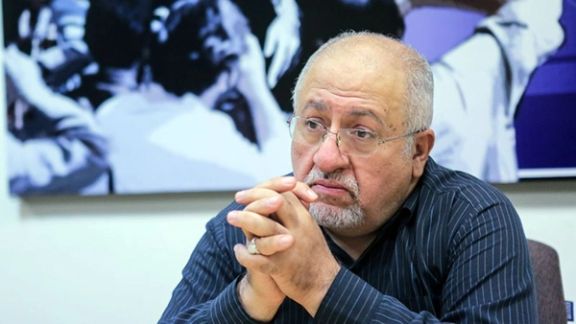
However, Haghshenas says the hard core of political power in Iran [meaning Supreme Leader Ali Khamenei] should pave the way for upholding the Constitution by September particularly because a parliamentary election is going to be held in March next year. He also pointed out that none of the crises that have led to major protests since 2019 have been resolved. Meanwhile, he suggested that Raisi should resign and call for an early Presidential election.
He also suggested that the Guardian Council should do away with its selective supervision of vetting candidates before elections. The Council, a constitutional body indirectly controlled by the Supreme Leader, has the power to disqualify candidates for no clear reason. It used its power in the 2020 parliamentary and 2021 presidential elections to bar hundreds of candidates many of whom had previously served as lawmakers or as senior officials. The result was a massive rejection of ‘reformist’ candidates and handing full control to hardliners.
Meanwhile, Mansoor Haghighatpur, a moderate conservative lawmaker close to Ali Larijani the former Speaker of the parliament charged that a certain political group [meaning the ultraconservatives] want to run the country with a team of only 30 to 40 individuals.
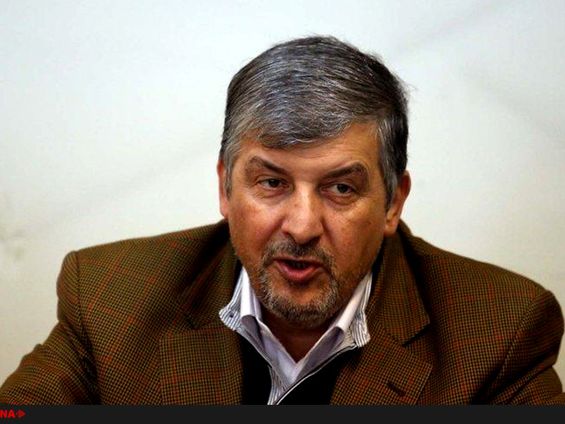
Haghighatpur further charged that the ruling group only believes in its own members and considers other politicians as traitors and spies. His comment followed accusations of espionage against former President Hassan Rouhani and his aides and IRGC figurehead Hossein Taeb's call for putting Rouhani on trial.
He said that this group of 30 to 40 ultraconservatives came to the forefront of political leadership since former populist President Mahmoud Ahmadinejad came to power in 2005 and lately took over the entire political establishment after the 2020 and 2021 elections.
In another development, Iranian traditional conservatives flagship daily newspaper Resalat wrote on Saturday that President Ebrahim Raisi’s administration does not understand concepts such as inflation and repayment of loans. The daily told Raisi and his ministers: "Your daily journey starts from the parking at your home and ends in the parking lot of your office and you do not know anything about the people's problems."
Resalat added: "As a result, you constantly ridicule the people and subsequently the people turn their backs on you." The daily was referring to a statement by Raisi's Welfare Minister Solat Mortazavi who when asked last week how low-paid workers can make ends meet, he replied: “They should save!" Resalat called the minister's reaction "an outcome of ignorance."
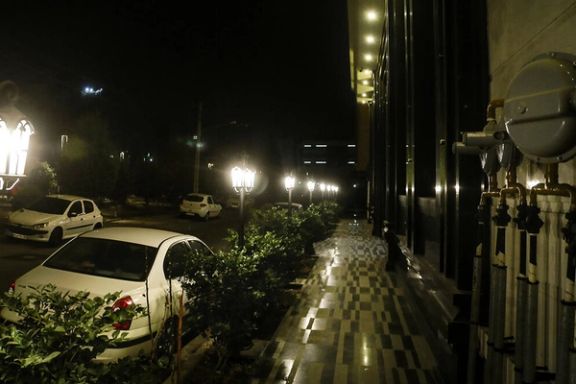
Iran’s electricity usage has leapt by 20% in a year – increasing strain on a national power grid already struggling to meet demand.
The latest figures of nearly 55 thousand megawatts on Saturday are a huge rise on May last year.
While peak electricity consumption is usually expected to start in mid-June each year, rising temperatures have led to an early surge in the use of air conditioning equipment, according to Tasnim news agency.
Consumption during the same period last year was 45,840 megawatts, added the report.
The increase will put further strain on the country's power grid. Iran's electricity sector is in dire need of significant investment, and the country has been struggling to attract foreign investment in recent years.
Power plant capacity and fuel supply are both inadequate to meet demand, and blackouts regularly happen in summer. Even so, Iran exports electricity to Iraq.
Iran has failed to realize its annual electricity growth plan for several years in a row, while consumption continues to grow, in part driven by extremely low prices. Government funding to the energy sector of up to $60 billion a year effectively provides an indirect subsidy to consumers and businesses fuelling this demand.
The country needs at least 5 to 7 percent electricity generation growth annually to address the increase in domestic demand.
Iran on average has 300 sunny days annually but has yet to take advantage of the opportunity for solar power because of the failure to develop the renewable energy sector. Wind and solar power generation have only 0.5% share of total power generated domestically.

A recent scandal over Iranian lawmakers receiving cheap SUVs as bribe has deepened friction between the parliament speaker and the ultra-hardliner Paydari group.
Khabar Online, a news website close to the former moderate-conservative speaker of parliament, Ali Larijani, wrote Saturday that the scandal has turned into an excuse for the two major groups of hardliners in the parliament -- supporters of Speaker Mohammad-Bagher Ghalibaf and Paydari Front lawmakers – to settle political accounts.
In the past few days, Paydari Front lawmakers such as Morteza Agha-Tehrani have been assailing Ghalibaf who describes himself as a neo-conservative. The Speaker says he had known about the bribery and stopped it, while Agha-Tehrani accuses him of doing nothing to stop it and failing to offer convincing explanations since the news broke out last week.
Ghalibaf’s supporters and Paydari, which seeks the establishment of a traditional Islamic government, have also been threatening each other of revelations about other corruption cases.
“Agha-Tehrani’s interview displayed that your group is not after transparency,” pro-Ghalibaf lawmaker Mojtaba Tavangar wrote in a letter to Paydari Party secretary general, Sadegh Mahsouli, Friday and alleged that some Paydari lawmakers had also been among the recipients of the SUVs.
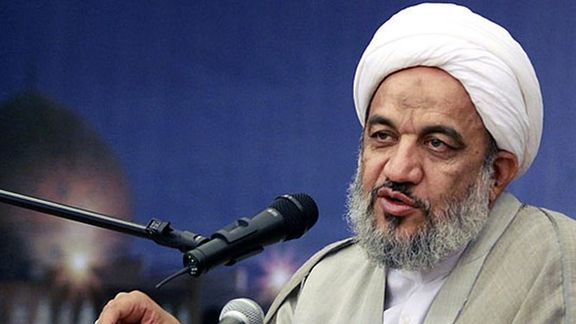
Over seventy SUVs were offered to the lawmakers at a lower price by the ministry of industry ahead of lawmakers’ discussion of a motion in December last year to impeach former minister of industry, Reza Fatemi-Amin for his “inadequate performance” including failure to control rising prices for domestically produced vehicles, their low quality, preventing competitive imports, and corruption in the industry.
After the impeachment drive failed, lawmakers planned another motion in April, which eventually succeeded.
Ahmad Alirezabeigi, the lawmaker who blew the whistle two days before the the second impeachment, claims he only meant to combat corruption and had no hidden agenda when he disclosed the bribery by, or on behalf of the minister.
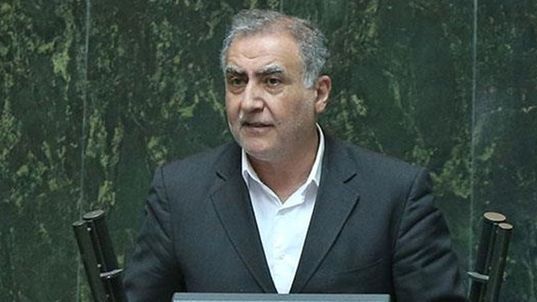
“Some people gain privileges on various excuses to compromise and undermine the supervisory duty of the parliament,” he said Wednesday while calling such bribery a “tradition in the parliament” to prevent impeachments.
“I have nothing to do with the opportunism [of others] which is related to the elections,” he told Khabar Online, adding that “the two groups of lawmakers have waged a war over power to get more seats [for their respective factions] in the upcoming elections.”
“The speaker must transparently announce what measures he took against the unlawful payment to some [lawmakers] if he claims that he found out beforehand and stopped it. What measures were taken against the offenders? To which court were they referred to?” he asked.
In recent years car imports have been largely banned due to the shortage of hard currency. This has increased demand for domestically produced vehicles purchasing of which requires signing up and paying reservation fees. There are often long waiting lists due to the high demand in the market.
Fatemi-Amin was the first minister in President Ebrahim Raisi’s cabinet to be impeached. After initial denials by him and other officials, he was eventually sacked by the parliament on April 30.
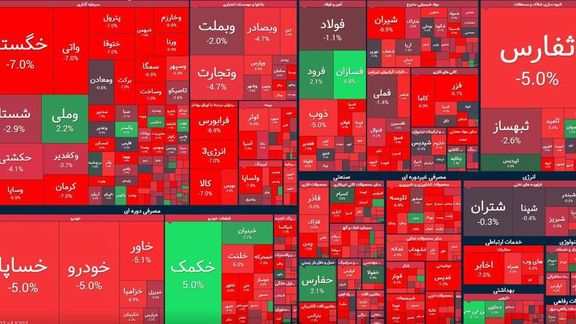
Tehran's stock exchange indices fell for the fifth consecutive day on Saturday amid a five-year economic crisis, with 50-percent annual inflation and a battered currency.
The main index decreased nearly 2.8% and more than 80% of shares experienced a fall in price.
According to official Tehran stock exchange reports, in today's transactions, natural persons withdrew about 38,000 billion Rials (more than 73 million dollars) from Tehran stock market, so that the total withdrawal of money by natural persons in the past five days, reached approximately 168,000 billion rials (323 million dollars).
Considering the current exchange rate of the US dollar in Tehran’s open market, the stock Exchange has lost 27 billion dollars of its value during this declining period.
The fall represents a ten-percent decline in the official value of all shares in the market, but most companies are directly or indirectly owned by state entities, and it is hard to put a clear value on assets.
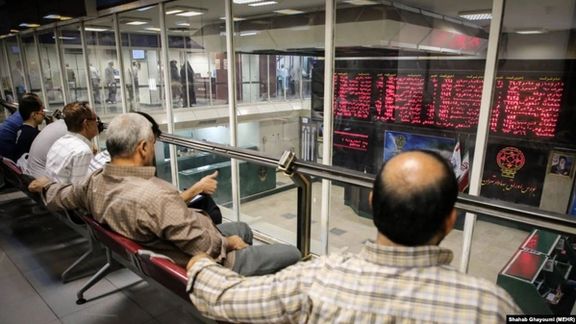
Although the fall is not dangerously high by international standards, Iran’s stock market is controlled by the government and investors fear possible machinations in inflating and deflating the market.
The stock market decline is the latest negative economic news for the government of President Ebrahim Raisi, who is widely criticized as inefficient and incapable to deal with multiple problems.
However, the main trigger for the overall economic crisis was the move by the United States to withdraw from the JCPOA nuclear accord in 2018 and impose crippling sanctions on Iran’s oil exports and international banking.
The government, which is highly dependent on oil revenues, now suffers from an acute shortage of foreign currencies needed for food and raw material imports. The national currency reserves estimated to have been around $150 billion were mostly spent since 2018. This has led to a 12-fold fall in the value of the rial, fueling more inflation.
Economists expect hyper-inflation in coming months as the country experiences serious political instability following months of anti-government protests.
In July 2020, Tehran’s stock market fell by more than 30 percent in about one week and some shares fell by as much as 50 percent, wiping out the savings of many small investors who had believed government promises of a safe stock market.
Some observers said at the time that government entities had inflated the stock market and ripped large profits before its sudden fall. The memory of the 2020 crisis has remained strong among investors who become jittery at any sudden downturn.
Many economic analysts believe that government manipulation also added to the crisis, which has led to negative fundamental analyses of market shares.
Fall in steel producers’ shares, as well as mining companies contributed most to the decline in the past five trading sessions.
The production of steel and petrochemicals, the main non-crude exports, have suffered declines in the past year due to a shortage of natural gas, a vital energy source for these industries. Although Iran has the second largest natural gas reserves in the world, its output is declining due to lack of investments and Western technology.
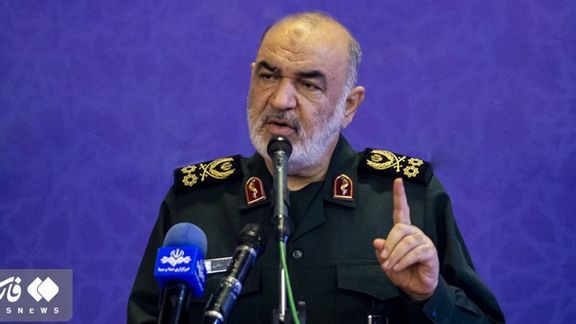
Iran’s Revolutionary Guard (IRGC) commander Hossein Salami was quoted as saying on Saturday that Israel’s destruction is not too far away.
Salami made the remark during a meeting with the family of Hassan Tehrani Moghaddam, an Iranian missile development officer who died in 2011 in a large explosion at a test site. Although Iran denied that the explosion was the result of a sabotage operation, some Western sources later claimed that Israeli intelligence was involved.
The IRGC commander referred to Moghaddam’s tombstone where it says, “Here is interned a man who wanted to destroy Israel,” and said, “Today witnessing the decline of enemies, especially the Zionist usurpers and child-killers,” Moghaddam’s dream will soon come true.
Iranian officials, especially IRGC commanders have recently become much more vociferous in their attacks against Israel after a Chinese brokered agreement with Saudi Arabia to restore diplomatic relations. The agreement is seen in Tehran as a defeat for the United States and an end to Iran’s regional isolation.
Attacks and counterattacks between Israel and Palestinian militant groups flared up in early April and again this week, while the Iranian regime began openly saying that Israel’s destruction is imminent.
Other IRGC officers on Saturday spoke about progress in weapons development. Deputy commander of IRGC’s aerospace force, Gen. Majid Mousavi announced that the flight time of Islamic Republic’s drones has reached 24 hours.
Mousavi announced that Israel’s nuclear reactor is a legitimate target for Iran’s increasingly accurate missiles and drones.
Iran has supplied kamikaze drones to Russia that have been used extensively against Ukrainian civilian targets.